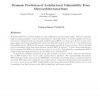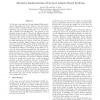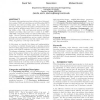492 search results - page 55 / 99 » Predictable performance in SMT processors |
ISCA
2007
IEEE
14 years 3 months ago
2007
IEEE
Transient faults due to particle strikes are a key challenge in microprocessor design. Driven by exponentially increasing transistor counts, per-chip faults are a growing burden. ...
IEEEPACT
2009
IEEE
2009
IEEE
Soft-OLP: Improving Hardware Cache Performance through Software-Controlled Object-Level Partitioning
14 years 3 months ago
—Performance degradation of memory-intensive programs caused by the LRU policy’s inability to handle weaklocality data accesses in the last level cache is increasingly serious ...
ISCA
1998
IEEE
14 years 1 months ago
1998
IEEE
As the issue rate and depth of pipelining of high performance Superscalar processors increase, the importance of an excellent branch predictor becomes more vital to delivering the...
EUROSYS
2007
ACM
14 years 5 months ago
2007
ACM
The major chip manufacturers have all introduced chip multiprocessing (CMP) and simultaneous multithreading (SMT) technology into their processing units. As a result, even low-end...
ISCA
2002
IEEE
14 years 1 months ago
2002
IEEE
Techniques for analyzing and improving memory referencing behavior continue to be important for achieving good overall program performance due to the ever-increasing performance g...



